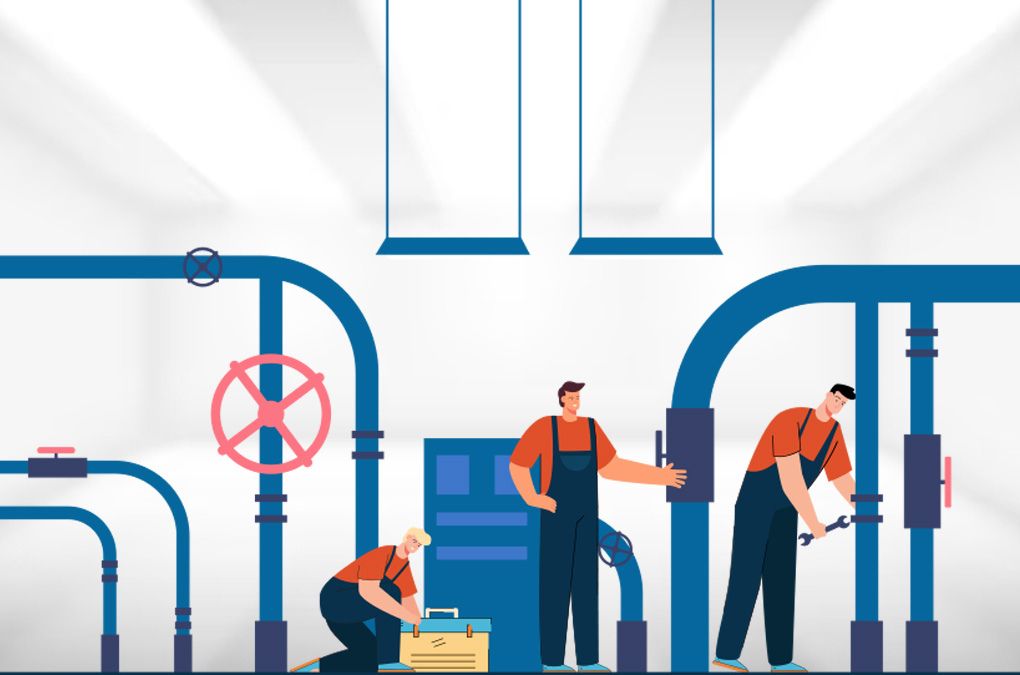
Few things are more frustrating than turning on the tap to only get a trickle of water… Or, swinging to the opposite extreme, experiencing a jet that splashes back and soaks your shirt.
Well, those are all symptoms of water pressure issues, and as you may already know, they can significantly disrupt daily life.
And you aren’t alone. Among the plumbing problems faced by homeowners and businesses alike here in South Jersey, the most common may very well be those related to water pressure. Today, let’s shed some light on the causes and offer practical solutions, ideally helping your home or business flow smoothly (literally)!
Understanding Water Pressure
Water pressure is the force that propels water through your plumbing system and into your fixtures and appliances (usually in the range of 45-80 psi). It’s crucial for the efficient operation of your home or business, affecting everything from showers to washing machines. Low water pressure can show itself as weak flow from taps and appliances, while high water pressure can lead to leaks and damaged fixtures.
Common Causes of Low Water Pressure
There are obviously many reasons why you could be experiencing low water pressure, but these are the most common:
Corroded Pipes or Fixtures: In many homes, the interior of pipes may become corroded or encrusted with mineral deposits over time.This corrosion can significantly reduce the inner diameter of the pipes, restricting water flow and leading to low pressure.
Leaking Pipes: Cracks and holes are another main cause. Even small leaks can divert water flow and lead to noticeable drops in pressure. If you notice sudden and unusually low water pressure be sure to look into this!
Faulty Pressure Regulators: These devices control the pressure of water entering your home; if they fail, pressure can drop significantly.
High Water Pressure Causes
Water pressure that is way over the top can be as much of a nuisance as low pressure. Some of the common causes include:
Thermal Expansion: When water heats up in your water heater, it expands. If your home’s plumbing system doesn’t have a way to accommodate this expansion (like an expansion tank), the pressure inside the system can increase.
High Municipal Pump Pressure: To ensure water reaches all areas of a community, municipal water suppliers might set the pump pressure higher. This can result in homes closer to the pump or at lower elevations experiencing excessively high water pressure.
Faulty Installation or Incorrect Settings: Improper installation of plumbing components or incorrect settings can also lead to high water pressure. This includes misconfigured valves, pumps, or regulators that were not adjusted properly to the needs of the home’s plumbing system.
Diagnosing Water Pressure Problems
Identifying whether the problem affects a single fixture or your entire system is crucial. Single-fixture issues often point to localized clogs or faults, while whole-system problems may indicate supply issues or regulator failures. Checking for leaks and testing water pressure with a gauge can help diagnose the issue.
But don’t think you have to do this alone! Calling in a professional plumber can make all the difference and help you avoid a potential catastrophe.
Solutions to Water Pressure Problems
As promised, we’re not just here to show you what the issues are but how to get them dealt with. Here are a few tips that will ensure proper water pressure and flow.
1. Clean or Replace Clogged Fixtures: Start with cleaning aerators and showerheads to remove mineral buildup. If fixtures are beyond cleaning, consider replacing them.
2. Repair Leaks: Inspect your plumbing for leaks and repair them promptly. Even small leaks can significantly affect water pressure.
3. Replace Corroded Pipes: In older homes, replacing corroded or clogged pipes can dramatically improve water pressure.
4. Install a Water Pressure Booster Pump: If the incoming pressure is low, a booster pump can increase the water pressure throughout your home.
Should I Hire a Professional For Water Pressure Issues?
Hiring a professional plumber to address water pressure issues is crucial for several reasons.
First, professionals have the necessary experience and tools to accurately diagnose the root cause of pressure problems. Secondly, plumbers can offer expert advice on preventive measures and long-term solutions, such as installing pressure regulators or expansion tanks, to avoid future problems.
In the end, hiring a professional is always a wise investment for any home/business owner facing water pressure dilemmas.
The Takeaway?
Water pressure issues don’t need to be shrouded in mystery. With just a little knowledge and the right professionals by your side, you will not only know how to get a problem fixed, but also how to prevent future ones from happening!
